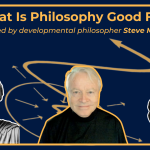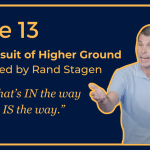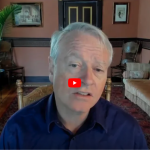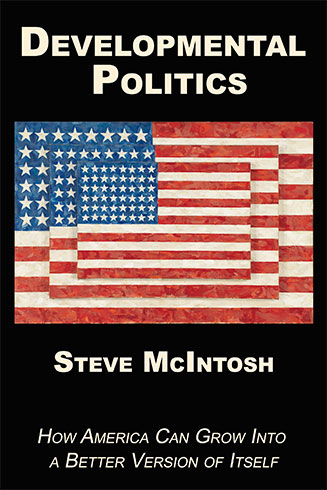Integral Consciousness
Chapter Five Integral Politics
The rise of every historically significant new worldview brings about substantial political evolution. Each emerging worldview’s new political vision serves as a showcase for its relatively more evolved values and higher ideals of morality. For example, we noted that emerging modernism rejected the oppressive structures of feudalism and absolute monarchy and championed the new ideals of freedom and equality embodied in the call for democracy. This movement for democracy was, in fact, one of the main themes of the “New Philosophy” that articulated the modernist vision and served to define the character of the Enlightenment. Then again in the 20th century, emerging postmodernism rejected the ethnocentric morality that condoned racism and the slaughter of innocents abroad and championed the political issues of civil rights, women’s rights, and peace in Vietnam. The political issues of the war in Vietnam, and the struggle for equality served to bring people together in a common cause. Thus many who adopted the postmodern worldview in the sixties and seventies did so because they had been politicized through their allegiance to these causes.
Just as much of modernism and postmodernism emerged from the crucible of politics, we can expect something similar with the rise of the integral worldview. After considering this carefully for a long time, I’ve come to the conclusion that the politics of integral consciousness can be expected to engage life conditions in the 21st century in two ways: first, integral politics will make common cause with the postmodern political agenda, helping it to be more effective by moderating it and by translating its truths into terms that can be better understood by the modernist majority. And second, integral politics will demonstrate its new ideals by championing a transcendent vision of a more evolved form of human political organization. We’ll examine each of these aspects of integral politics in turn.
The Politics of the Spiral
The left-right conception of politics that dominates most political discourse in the developed world is woefully simplistic and generally inadequate as a model of the complex political dynamics of the 21st century. For example, we can see in history how the roles of liberal and conservative have actually reversed position several times (the Republicans were the progressives of the 19th century), and thus it is likely that some of those who now identify themselves as progressives may in the future find themselves defending the status quo. As we look at the politics of the developed world through the lens of the spiral of development, we can see that most of the current political debates are occurring within the context of modernism; in the U.S., the Democratic and Republican parties are both essentially modernist. We can see the influences of traditionalism and postmodernism tugging on either side of the modernist milieu, but we can also see how the ideologies of these other worldviews are significantly diluted through the compromises that characterize the modernist debate.
When we use the spiral to understand the current political landscape we must keep in mind that among all the fronts of human evolution to which spiral analysis brings light, politics is the most subtle and complex. When it comes to politics it is difficult to say anything general enough to be meaningful without being contradicted by numerous exceptions. For example, within each worldview’s agenda can be found those who emphasize freedom and those who emphasize order. This often results in activists of decidedly different overall political persuasions finding themselves in temporary alliances with “strange bedfellows.” And this is due to the many sub-currents and eddies that occur within the main currents of the spiral’s larger dialectical structure. Therefore, although the spiral can be extremely useful in understanding politics and engaging in political activism, its effective use in politics demands a high degree of sophistication and an analysis that is sensitive to the subtleties and nuances of the complex historical dynamics it seeks to describe.
When we examine politics from the perspective of the spiral we can begin to see the true significance of the worldcentric morality embodied in the politics of postmodernism. From a moral point of view, the higher values that are awakened when people enter the postmodern worldview eclipse the legitimacy of all previous forms of ethnocentric political justification. Postmodernism’s deep sympathy for the disadvantaged and oppressed, its righteous outrage over ongoing injustice and hypocrisy, and its own sense of shame about the West’s legacy of exploitation, are all the result of significant evolution within consciousness. Integral consciousness must thus acknowledge the evolutionary importance and beauty of postmodernism’s higher morality, even as it recognizes that this development is currently manifest in an immature form.
The integral perspective rejects the idea that the politics of left and right can be compared to the squabbling of selfish children who refuse to compromise for the greater good. This may be true at the modernist level, but with the rise of postmodernism’s unprecedented worldcentric morality a new era of history is born. Postmodernism represents the beginnings of a new political consciousness that rejects the “Machiavellian realism” of modernism in favor of a worldview that demands real fairness for every living person, regardless of where they live or how much wealth they have. In its most advanced expressions, postmodern politics embody the spiritual ideals of universal justice and worldwide equality; and these ideals contrast sharply with modernism’s historical tolerance of racism, sexism, ultra-nationalism, and the economic blindness that condones the ongoing destruction of the environment. In solidarity with postmodernism, integral consciousness sees that in the long run, the ethnocentric politics of group selfishness are dead, that the future belongs to those who recognize that all lasting political progress is grounded in morality, and that everybody counts. The integral worldview thus recognizes that civic improvement ultimately depends on the further development of the ethic of fairness within human society and government—integral consciousness can see that the increasing morality of interpersonal relations is the foundation of all real political evolution.
As it makes common cause with postmodern politics integral consciousness recognizes that postmodernism’s biggest political problem is its relative impotence. Since its rise as a political force in the sixties, postmodernism has been influential in the politics of the developed world (achieving considerably more success in Europe than in the U.S.), but there are still many important ways in which its agenda is currently trumped by modernism. Yet from an integral perspective, this is evolutionarily appropriate. Postmodernism may stand for the future of worldcentric political mores, but its policies are not yet mature enough to take charge of the developed world. Integral consciousness can thus make political progress by helping to moderate and restrain postmodernism’s radicalism so that its important contributions can be better integrated into the politics of the developed world. Integral politics must therefore concentrate on the two areas where I believe postmodernism needs the most development: moderation of its often staunch anti-modern bias, and education regarding the “fragile ecology of markets.”
/snip/
Integral Politics and Global Governance
Let’s consider the problems of the world. What’s your choice for the worst one? Environmental degradation and global warming? Genocide in Africa? Third world hunger and poverty? Terrorism? War and threats of war? Or maybe even unfettered corporate globalization and the increasing homogenization of the world’s culture? Many of us are deeply concerned about these problems, but most of us don’t really know what we can do personally, or even what the world as a whole can do to solve these global dilemmas. Yet our concerns continue to grow. In fact, the more our consciousness develops the more our sense of morality—our estimate of the scope of those worthy of moral consideration—expands to encompass the world. Indeed, a worldcentric morality is a clear marker of higher consciousness. But apart from considerations of higher morality, ameliorating global problems is increasingly becoming a matter of self-interest. The globe is more connected and interdependent than ever before, so that what happens in Indonesia or Sudan increasingly effects conditions here in the developed world. Yet with the Republican party having such a strong influence on the American government, and with the evident impotency of the United Nations, it seems likely that these global problems are only going to get worse. But what if we had a clear solution to not only one or two of these problems, but a solution to all of them through the same method?
Global governance. This idea usually evokes one of two reactions: either that global governance is an idealistic fantasy best left for another century, or that global governance is the world’s worst nightmare, a scenario in which the corporate elite gain complete control, and everything that is currently wrong with the U.S. government becomes writ-large on the world. Most people don’t like government and often have an intuitive feeling that the direction of evolution is toward less government, not more. These intuitions arise from the fact that the existing state of consciousness in the world is not yet mature enough to effectively manage and contain the awesome power of a supranational law-making authority. And from an integral perspective, a global authority constituted without the benefit of integral thinking would indeed be most undesirable.
A world federation based on postmodern consciousness might embody a worldcentric morality, but as we’ve discussed, postmodernism’s anti-modern bias often blinds it to the fragility of economic ecologies and the central importance of modernism in global evolution. Although many postmodernists aspire to “think globally and act locally,” their values do not provide the complexity of understanding necessary to create or administer a system of functional global law. Although postmodern values must play an important role in any sustainable form of global governance, integral values will also be crucial. And while global governance based solely on postmodern consciousness may be unrealistic, a world government run by modernists would also be clearly undesirable because the resulting unchecked corporate expansion would only exacerbate terrorism, environmental degradation, the destruction of indigenous culture, and the spread of the generic blight of corporate mediocrity. Modernist consciousness is good at creating democracy at the level of the nation-state, but when it comes to the significant problems that will confront a world federation, the modernist worldview is not evolved enough to satisfy the legitimate concerns of postmodern consciousness while simultaneously dealing with the large populations who make meaning at the traditional level and below. And it goes without saying that a world government based primarily on the values of traditional consciousness would constitute a significant regression in civilization—a totalitarian scenario of Orwellian proportions!
Fortunately, with the rise of integral consciousness new possibilities appear. These new possibilities become evident when we take an evolutionary perspective on human political organization. According to Robert Wright, in 1500 B.C. there were approximately 600,000 sovereign political groups in the world. Today these groups have been consolidated into just 193 sovereign countries. Although the break up of colonial empires in the 20th century created some new nation-states, the overall trend of the century was toward greater interdependence and international consolidation, as evidenced by the creation of the United Nations and the European Union. From the beginnings of human law with the Code of Hammurabi and the Ten Commandments, up to the era of large federations of the United States and the European Union, law and government have continued to evolve over the centuries into larger and larger political configurations. However, although the world enjoys a growing body of international law, these laws are largely unenforceable, and the United Nations and the international system it administers is still based on the underlying principle of unrestricted national sovereignty. So although the recent strengthening of the World Court in the Netherlands is a positive step, the phrase “international law” remains somewhat of an oxymoron because of its implied preservation of “national” power and the “state of nature” that exists between sovereign nations. The significant difference between treaties (and other inter-national forms of agreement) and true laws is that in general, treaties apply to countries whereas laws apply to individuals. Law is what replaces the state of nature between “sovereign” individuals or groups. So no matter how much power the U.N. or other international authorities are given, until there is true global law with jurisdiction over individuals, the evolutionary pressures that have produced a world of nation-states will continue to push and pull toward the next developmental level—a world federation.
While we can recognize that the state of the world’s consciousness is not yet ready for global governance, we can also see thatglobalization of the world’s economy and culture is nevertheless racing ahead. From an integral perspective the world may never by fully readyfor global governance—by the time consciousness has evolved to the point where everyone is responsible and worldcentric we may not need government at all. Yet when we make a realistic assessment of the ongoing evolution of global civilization in the 21st century, no matter how premature the idea of global governance may seem, the current de facto system of global politics is only going to become increasingly inadequate for a globalized world. As evolutionary pressures continue to mount, we will have two choices: we can either evolve further, or we can collapse back into regression. So if we want to choose the former option, then it is now time to begin discussing what further evolution actually looks like.
The type of global governance envisioned by the integral worldview would consist of a federation of nations united under a constitution of laws guided by the insights and principles of integral philosophy. An integral world federation would be instituted to provide democratic oversight of the global economy, protect the world’s environment, establish a universal bill of human rights, preserve cultural diversity, and bring an eventual end to war, disease, and poverty. And even with limited jurisdiction (leaving national legal systems mostly in place), an integral world federation would provide for a system of global justice which would reduce the incentives for terrorism. Such a federation would not need to encompass the globe in one step. It would have to begin with a union of the E.U. and U.S., with other developed nations such as Australia and Japan joining at the beginning. Gradually, other countries could join the federation, but no country would be forced to join, with membership in the federation requiring a supermajority vote of a country’s population. An integral global authority would gradually encompass the world through evolutionary methods. National boundaries and local economies would be protected, and full membership in the federation would be granted only to countries that have achieved requisite degrees of freedom and democracy. Just as the E.U. has been gradually expanding, encouraging the political, economic and cultural evolution of those nations that aspire to join, so too could a world federation be gradually enlarged.
The benefits of effective global governance would be abundant. Democratic control of the global economy would produce greater fairness for individuals and fragile local cultures while at the same time producing greater overall prosperity. An integral world federation would have the authority to protect human rights and the world’s environment, inaugurating the kinds of safeguards that are currently impossible in a world of competing nation-states. It will almost always be morally illegitimate for one sovereign country to attack or dominate another sovereign country, regardless of the context. But a democratically controlled global federation will have the moral and political authority to be legitimately coercive over individual offenders(rather than entire countries) when it comes to preventing the destruction of people’s lives or the environment.
In appendix A, entitled: A Proposal for Integral Global Governance, we’ll explore an example of a potential structure that could be used to enact an integrally informed federal system of global governance. However, at this point, rather than going on about the advantages and solutions that could be provided by a world federation, I now need to address the reasonable objection that, even if it were a good idea, at this point global governance is nothing but a “left-wing peacenik fantasy” only dreamed about by “wooly-minded one-worlders.”
/snip/





